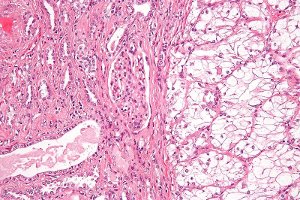
Pfizer has reported that the Phase III study of Inlyta (axitinib) conducted in treatment-naïve patients with advanced renal cell carcinoma (RCC) failed to meet its primary endpoint.
The primary endpoint of the AGILE 1051 study was to demonstrate statistically significantly longer progression-free survival (PFS), versus sorafenib, in treatment-naïve RCC patients.

Discover B2B Marketing That Performs
Combine business intelligence and editorial excellence to reach engaged professionals across 36 leading media platforms.
Median PFS for Inlyta surpassed the median PFS for sorafenib, but did not meet statistical significance in the study.
Pfizer Oncology Business Unit clinical development and medical affairs senior vice president Dr Mace Rothenberg said the primary endpoint of the trial was narrowly missed.
"We are analysing the study findings to determine whether further evaluation of Inlyta in specific subpopulations of treatment-naïve patients with advanced RCC would be warranted," Rothenberg added.
"Since approval, Inlyta has established its utility in the second-line setting where it is an important treatment option for many patients with advanced kidney cancer."

US Tariffs are shifting - will you react or anticipate?
Don’t let policy changes catch you off guard. Stay proactive with real-time data and expert analysis.
By GlobalDataThe overall survival, response rate and safety were the secondary endpoints of the study, which even analysed the pre-specified subgroups that included patients with either good Performance Status (ECOG PS 0) or intermediate Performance Status (ECOG PS 1).
The median PFS for Inlyta exceeded the median PFS for sorafenib in ECOG PS 0 pre-specified subgroup patients, while no difference between Inlyta and sorafenib was noted in ECOG PS 1 pre-specified subgroup patients.
Adverse events for Inlyta were constant with previous findings in Inlyta patients, with advanced RCC treated with prior systemic therapy.
Inlyta, a kinase inhibitor, is an oral therapy designed to inhibit tyrosine kinases, along with vascular endothelial growth factor receptors 1, 2 and 3, which can influence tumour growth, vascular angiogenesis and progression of cancer.
Image: High magnification micrograph of a clear cell renal cell carcinoma. H&E stain. Photo: Courtesy of Nephron.





